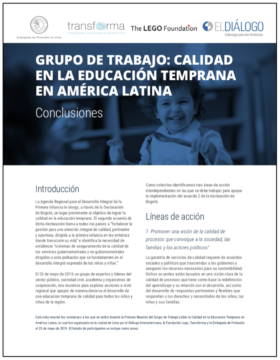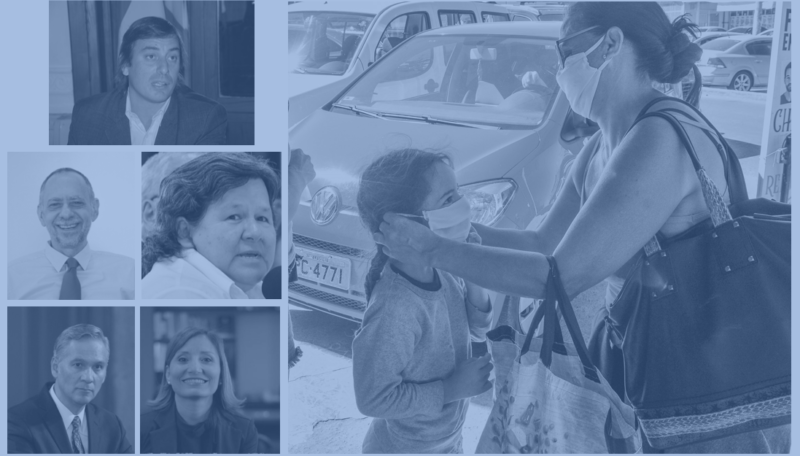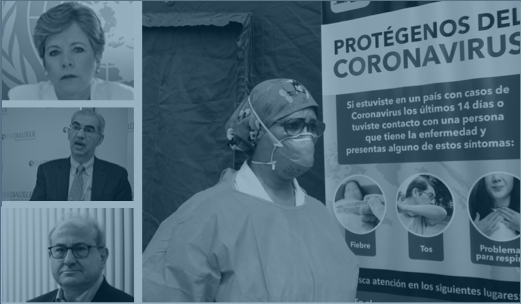
Calidad en la Educación Temprana en América Latina
Informe de relatoría sobre la calidad en la educación temprana en América Latina.
This post is also available in: Español
On June 18, 2020, the Inter-American Dialogue, the Early Childhood Development Action Network (ECDAN) and UNICEF’s Regional Office for Latin America and the Caribbean hosted a webinar to reflect on the progress made by countries in the region towards developing a Universal Basic Package for Early Childhood Services, as well as budgeting and monitoring mechanisms to properly implement them. Panelists from Peru, Mexico, Argentina, and the Dominican Republic shared the status of the implementation of these services in the context of the COVID-19 pandemic.
This virtual panel featured Ariela Luna, minister of Development and Social Inclusion in Peru, Ricardo Bucio, executive director of the National System of the Protection of Boys, Girls and Adolescents in Mexico (SIPINNA), Larissa Pumarol, deputy director of Plan Quisqueya Empieza Contigo (QEC) in the Dominican Republic and Javier Curcio, director of the Economics Department at the Universidad de Buenos Aires in Argentina. This seminar was co-moderated by Ariel Fiszbein, the director of the education program at the Inter-American Dialogue, Elizabeth Lule, executive director at ECDAN, Shekufeh Zonji, global technical lead at ECDAN and Monica Rubio, regional adviser at UNICEF LACRO. This event had over 520 participants join live.
Increasingly, Latin American countries are outlining the health, nutrition, development, education, and protection services that all children must access to ensure their full and adequate development. These needs have been amplified by the current COVID-19 crisis, making the establishment and dissemination of sufficient resources more urgent than ever. The panel described the current challenges facing early childhood development as well as the design and implementation of their countries’ ECD service packages.
The panelists agreed that one of the most important factors in developing successful and responsive early childhood care packages is multi-sector collaboration. In order to provide comprehensive care, ministries and political leaders must ensure that early childhood development is a key component of the country’s agenda. Particularly in the face of a global pandemic, panelists emphasized the importance of the continuity of early childhood care services.
Javier Curcio introduced a report detailing the agreement reached by experts of the region last year resulting in a report titled, "Constructing a Basic Package of Early Childhood Care Services" document where he outlined the criteria for a universal basic package. This report aims to provide guidance for countries in the region when developing comprehensive, regional standards for common practices towards early childhood development. The report has since informed the design and construction of various country-specific packages.
Minister Ariela Luna shared her work in developing resources and budget allocations for children throughout Peru. The program structure is organized by seven major objectives with 30 early childhood development programs that respond to each need including ones addressing malnutrition and educational access. These are then distributed primarily based on age group, need, and region. Luna noted that since 2008, Peru has experienced significant progress in developing and increasing access to children and family resources. She credits a large part of this progress to increased collaboration among the public and private sectors in Peru. She also highlighted the result-oriented focus of Peru’s programs, noting that officials measure the success of care services based on the impact of the resources rather than just whether they are received. Luna highlighted that early childhood development is now on the agenda for essentially all major political institutions and players in Peru. It will continue to be a priority in the country amidst the COVID-19 crisis in the efforts to ensure that children are healthy, educated, and have full access to their rights.
Larissa Pumarol, deputy director of Plan Quisqueya, outlined the initiatives taken in the Dominican Republic to support the develivery of early childhood care services. From the perspective of Plan Quisqueya, which seeks to reduce poverty and social exclusion through public policy, Pumarol reflected on a wide variety of services offered by the government from the prenatal stage all the way through adolescence. She outlined the factors that define their intervention model including nutrition, special needs, and protection from abuse. Most services are provided through the Instituto Nacional de Atención Integral a la Primera Infancia (INAIPI) and have been adapted to the pandemic through distributing essential resources to vulnerable communities and promoting telemedicine. Pumarol emphasized the importance of including prenatal care in early childhood development services, which include services such as breastfeeding rooms and socio-emotional support. She commented on the degree of public investment in these services, highlighting that most of their funding comes from the health sector and social services, but require greater investment in the education budget. Lastly, Pumarol emphasized the importance of intersectoral collaboration and its goal to increase registration systems and diversification of services.
Ricardo Bucio outlined Mexico's Nation Strategy towards Early Childhood Development, known as Estrategia Nacional de Atención a la Primera Infancia (ENAPI). He highlighted the importance of current laws protecting children’s rights but also the establishment of a clear plan for further development. Similar to the other countries on the panel, the strategy prioritizes children in poor and vulnerable communities and seeks to address the needs of all age groups but particularly ages 0-5. Bucio noted the main challenge of the strategy is implementing universal standards and procedures across the various states and municipalities of the country. He explained that since the pandemic the Mexican government has taken measures to determine what services are essential and are able to continue virtually in order to prevent high dropout rates or an increase in mortality. They have taken special care to ensure that children affected by poverty and those whose parents have lost their jobs still have access to these services.
Prior to the start of the webinar, we asked our audience: what basic early childhood services should receive priority during the COVID-19 crisis? The responses were encoded in a word-cloud presented below. 
The event concluded by a short round of questions and answers from the webinar’s audience on early childhood development in the wake of the pandemic. The questions focused on three main topics: whether early childhood development budgets would be impacted by the pandemic, the importance of leadership over intersectoral efforts, and the factors that help programs get results. The panelists acknowledged obvious decreases in national budgets, but universally emphasized the importance and protection of these services during the pandemic. Additionally, they agreed on the importance of strong leadership in development programs even in the context of a multi-sectoral approach. In considering the essential components of successful care services, panelists explained that the most important factor is creating programs that respond to the varying needs of children at every stage of their development.
This event is the second in a series of events on early childhood development and the Covid-19 crisis, find other events in the series here.
Informe de relatoría sobre la calidad en la educación temprana en América Latina.
This analysis offers a glimpse of the potential impact of the Coronavirus Disease 2019 (COVID-19) pandemic on US immigrants and family remittances. Past events involving worldwide crises can offer insight as to how this pandemic will likely affect remittance transfers. Considering migrants’ financial and health vulnerabilities as well as the forecast recession, a conservative estimate shows that remittances will register a -3 percent decline in 2020 relative to 2019, from $77 billion to $75 billion.
On March 19, the Inter-American Dialogue hosted a conference call with Alicia Bárcena and Santiago Levy. The discussion centered around the consequences of this pandemic for the global economy and the Latin American and Caribbean region in particular.
 Main Photo: Agência Brasília / Flickr / CC BY 2.0 / Adaptation Blue Wash
Main Photo: Agência Brasília / Flickr / CC BY 2.0 / Adaptation Blue Wash

 Video
Video